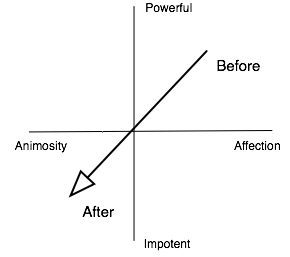 Stanley Kober writes about emerging alliances that don’t include the United States.
Stanley Kober writes about emerging alliances that don’t include the United States.
In his classic work, The Prince, Machiavelli wrote “a prince ought to inspire fear in such a way that, if he does not win love, he avoids hatred; because he can endure very well being feared whilst he is not hated.”
An idea we can sum up in this silly B-school style drawing. The line illustrates a cartoon version of what the Bush Iraq strategy has done for America.
Or consider the example of Microsoft. They began weak and accumulated a huge pool of affection. At the same time they became powerful. They abused that power, as amply demonstrated by the anti-trust case. Affection transitioned to annomosity. Meanwhile the bloom of Internet innovation lead to a perception that they were weak, or at least not as powerful as previously thought.
Or consider Google. Their “Don’t be evil” motto could be viewed as a strategic necessity; i.e. stay out of the left side of that graph. They currently sit comfortably in the upper right. Powerful, and therefor feared; but at the same time held in great affection.
When you are both powerful and well liked you need to avoid the trap Microsoft fell into. You need to exercise your power in ways that sustain that affection. The temptation is to exercise your power in offensive manners, achieving a series of short term wins, while doing progressive damange to your good will. One pervasive temptation is to exercise your power in secret assuming that you can have your cake and eat it too. It is always a bit difficult for an institution to distinquish true affection from meer sucking up to because it is powerful. Both of these can make everything looks fine and dandy until the bottom falls out. In the Microsoft case is almost a worse case scenario. It woke up to discover that it’s audience/customers’ affection was more calculating than they realized and at the same time they were revealed be a pretty offensive lot.
Notice how terrorism plays out on this plane. Your typical terrorist act has very little direct impact on the strength of it’s target. Modern open economies are hard to weaken with random acts of violence. Terror can weaken the states they target in two ways though. They increase uncertainty, risk. That lowers investment, which weakens the economy. I suspect that’s their largest effect on the vertical axis. A carefully targeted terrorist act can, of course, do greater harm becasue open market societies tend to condense hubs that make easy targets; once you notice them.
The terrorist, of course, has no affection for his target. The initial effect of the act of terror is to create sympathy for the victums; i.e. it moves the dot to right on that chart. But there is a scenario where the act of terror moves the dot to the left. The terrorist believes that this opponent is evil and that those who hold him in affection are deluded. If only they could see the reality of the situation then their affection would dissapate. So part of the goal of an act of terror is to force the opponent to reveal his true colors.
The extremely strong entity is particularly likely to fall right into this trap. Again consider Microsoft. When the Internet came over the horizon it create, in due course, a sense of panic inside of Microsoft. They responded by exercising a lot more of thier market power. Those of us who had watched that market power distroy other parts of the ecology weren’t suprised when that exercise was quite offensive. But this time around it was publically revealed by the anti-trust case.
I think you have your b-school graph wrong.
the before starting should be further on the Left Hand side of graph.
Also.
The terrorist/funadmentalist doesn’t see his target as a person, they see them as a lower being.
have a read of The UK times online.
Over simplification is a hallmark of b-school graphs!
Deamonization, black&white thinking, and overvaluing of one or a a few aspects is key to the cultish brainwashing around some terrorist activities. It’s all too common.
So you believe the entire country has joined a cult? 🙂
Some.
Pingback: Gideon Rosenblatt’s Blog » Blog Archive » Affection and Power